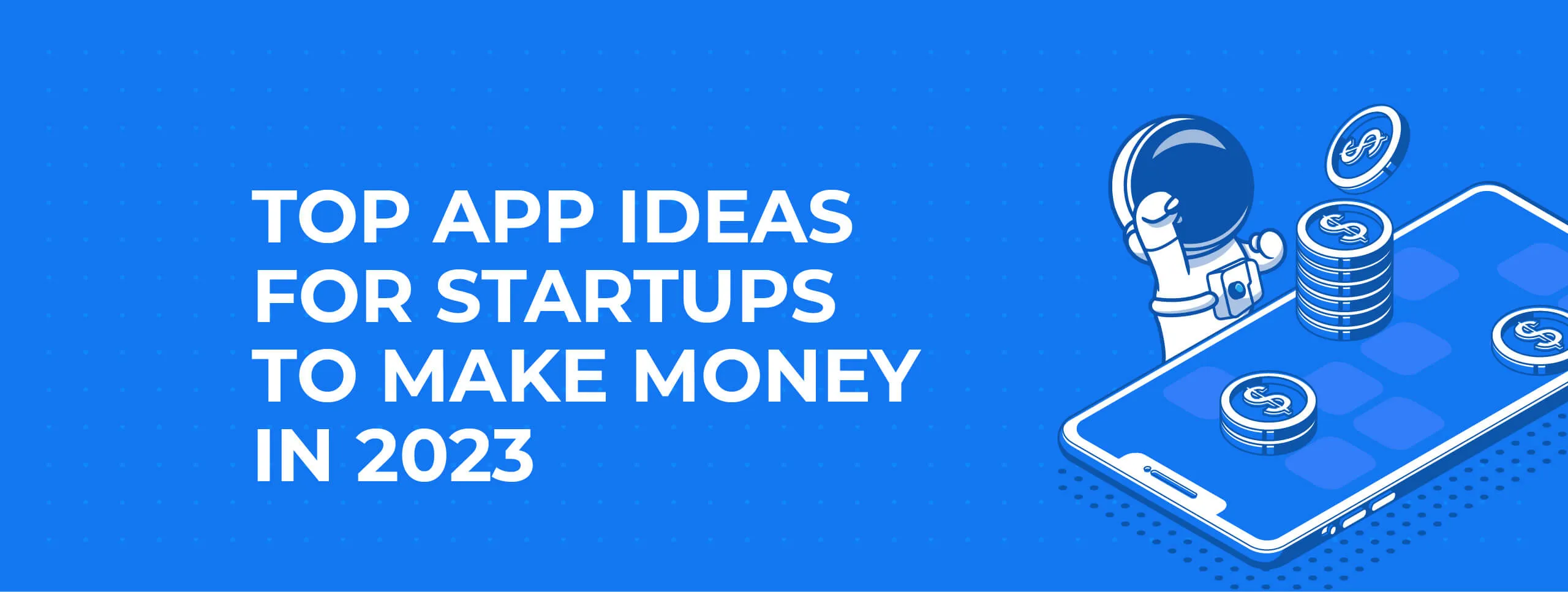
Top App Ideas for Startups to Make Money in 2023

Table of contents
- What type of apps are in high demand in 2023?
- Types of mobile Apps
- How to Create a Successful Mobile App for a Startup?
- Popular Examples of App with big ROI
- Process of App Development
- How Much Does It Cost to Develop an App?
- How to Monetize Your App
- How to Choose an App Development Company
- Cost estimation at Magora and Case Studies
- FAQ
- Final words
In the last few years, the interest in mobile apps has heightened, with more and more businesses and individuals seeking to benefit from the convenience and accessibility of mobile development technology.
As the market continues to grow, it is important for developers and businesses to stay ahead of the curve and identify which types of apps are in high demand. In this article, we will explore the current trends and predictions for the most popular app ideas for startups in 2023, based on data and insights from industry experts and market research. By understanding the evolving needs and preferences of mobile users, businesses and developers can create apps that are more likely to succeed and capture a larger share of the market.
What type of apps are in high demand in 2023?
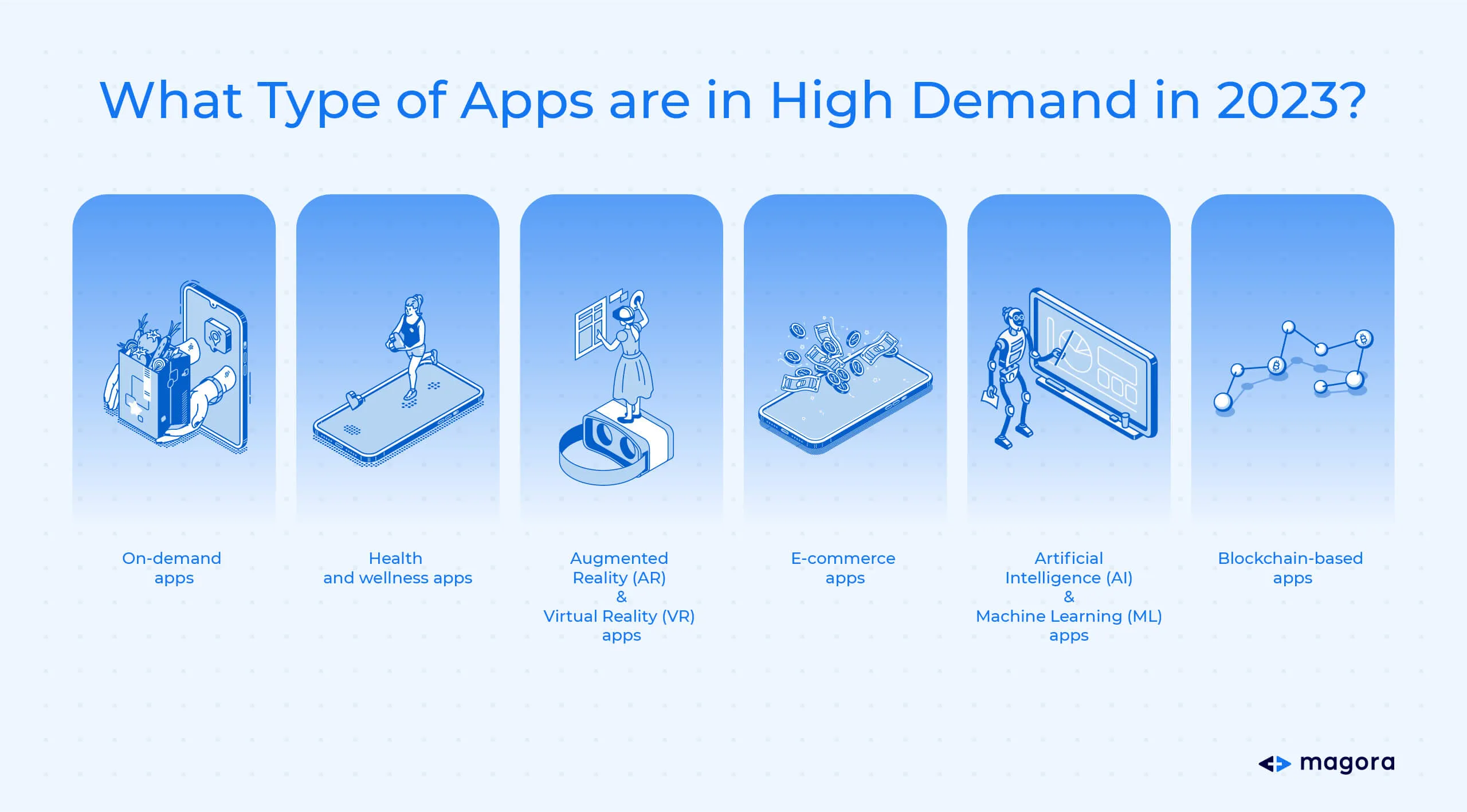
Predicting the exact types of mobile apps that will be in high demand in 2023 is challenging as app trends and user preferences can change quickly. However, based on current trends and emerging technologies, here are some types of apps that are expected to be sought-after this year:
On-demand apps
On-demand apps that offer services like food delivery, transportation, and home services are expected to remain popular as more people turn to convenience and speed in their daily lives.
Health and wellness apps
Health and wellness apps, including mental health apps, fitness apps, and apps for managing chronic diseases, are expected to be widely distributed as people become more conscious of their health and wellbeing.
Augmented Reality (AR) and Virtual Reality (VR) apps
AR and VR apps are predicted to gain significant traction as more mobile devices support AR and VR capabilities. These apps will likely be used for gaming, entertainment, education, and training purposes.
E-commerce apps
More people shop online today, particularly through mobile devices. It follows that e-commerce apps will continue to be in top positions in 2023.
Artificial Intelligence (AI) and Machine Learning (ML) apps
AI and ML technologies are predicted to become more prevalent in mobile apps, especially in the areas of virtual assistants, personalized recommendations, and predictive analytics.
Blockchain-based apps
Blockchain-based apps that offer enhanced security and decentralization are expected to gain more prominence this year, namely in the areas of finance, healthcare, and supply chain management.
Nevertheless, it's important to note that app trends undergo rapid changes, and it's crucial to stay up-to-date on emerging technologies and user preferences to ensure the success of your app.
Types of mobile Apps
Mobile apps come in various types, each serving a unique purpose and providing different functionalities to users. Here are some of the most common types of mobile apps:
Native Apps
Native apps are specifically designed for particular platforms, such as iOS, Android, or Windows, using platform-specific programming languages and tools. These apps ensure a smooth user experience and easy access to device-specific features.
Hybrid Apps
Hybrid apps combine the features of both native and web apps. They are created by means of web technologies like HTML, CSS, and JavaScript and then wrapped in a native container to allow access to device-specific features.
Web Apps
Web apps are mobile-optimized websites that can be accessed through a mobile browser. These apps are built using web technologies and are not installed on the device, but they can be saved to the home screen for easy access.
Progressive Web Apps (PWA)
PWAs are web apps that provide a native-like experience and can be installed on the device's home screen. They are also developed applying web technologies but include advanced features like offline functionality, push notifications, and access to device hardware.
Augmented Reality (AR)
Apps AR apps use the device's camera and sensors to overlay digital information on the real world. Such apps are good for gaming, entertainment, and e-commerce purposes.
Virtual Reality (VR)
Apps VR apps use the device's sensors and displays to provide a fully immersive experience to users. VR apps are commonly used for gaming, education, and training purposes.
Gaming Apps
Gaming apps are a popular category of apps that provide a range of games for users to play. These apps can be developed using native or hybrid technologies.
Utility Apps
Utility apps provide a range of practical functions, such as weather, news, productivity, health, and fitness.
Social Networking Apps
Social networking apps enable users to connect and interact with each other through a range of features like messaging, sharing, and commenting.
How to Create a Successful Mobile App for a Startup?
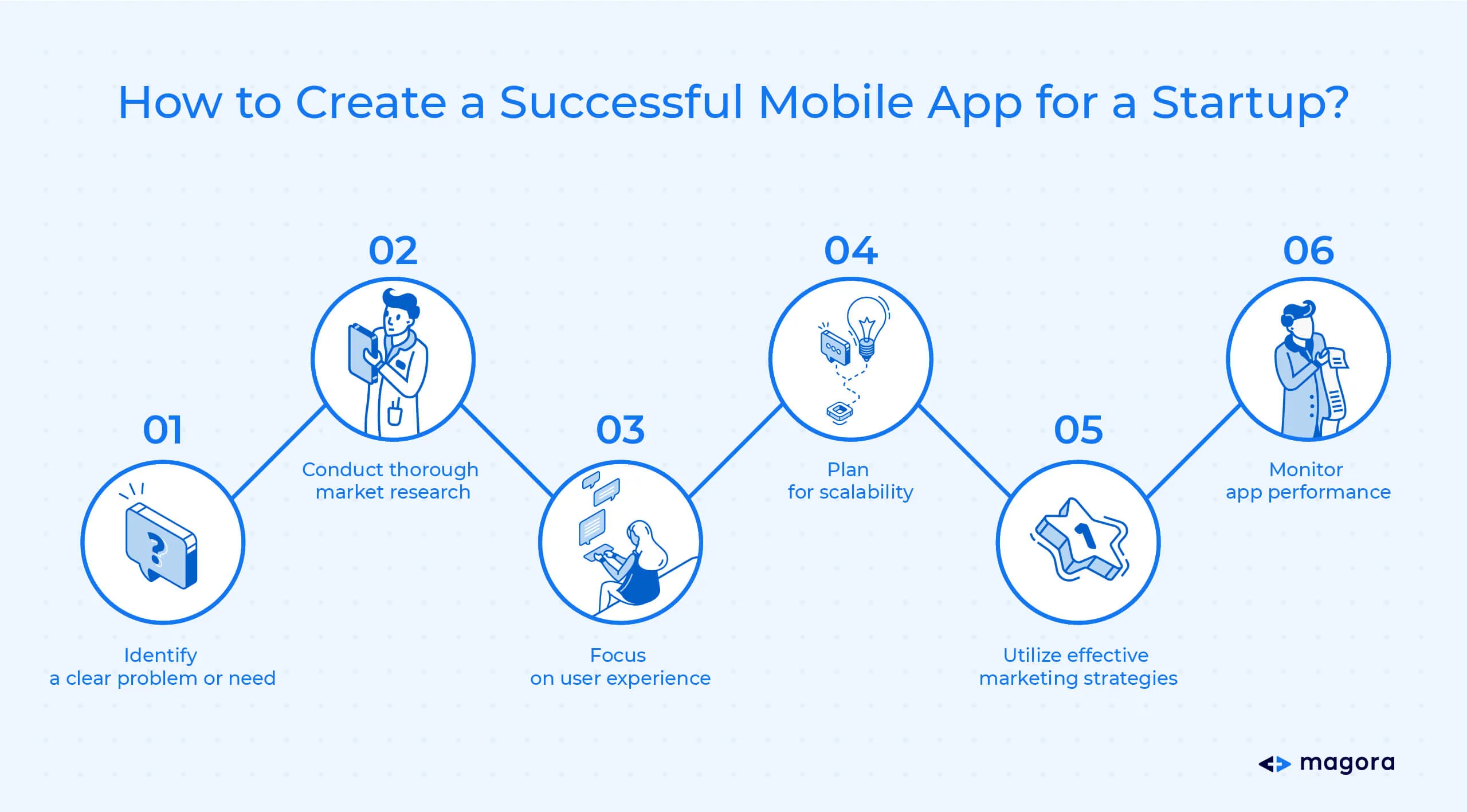
Creating a successful mobile app for a startup can be a challenging and complex process. However, by following a few key steps, startups can increase their chances of creating an app that resonates with users and helps them achieve their business goals. Here are some tips for creating a successful mobile app for a startup:
- Identify a clear problem or need. The first step in creating a successful mobile app is to pinpoint a clear problem or necessity that your app will solve. This could be anything from helping users manage their finances to facilitating the ordering of food from local restaurants. By identifying a concrete problem or need, you can ensure that your app provides real value to users.
- Conduct thorough market research. When you have figured out a problem or need, it is important to conduct profound market research to ensure that there is demand for your app. This can include analyzing competitors, surveying potential users, and testing early prototypes to gather feedback.
- Focus on user experience. User experience is critical to the success of any mobile app. Your app should be intuitive and easy to use, with a design that is visually appealing and aligns with your brand. Conduct user testing and gather feedback throughout the development process to ensure that your app meets the needs of your target audience.
- Plan for scalability. As your startup grows, your app will need to be able to handle increased traffic and usage. Ensure that your app is built to scale, with a solid backend infrastructure that can support growth and handle large amounts of data.
- Utilize effective marketing strategies. Even the best mobile app will struggle to gain traction without effective marketing strategies. Develop a marketing plan that includes social media, paid advertising, and other tactics to help you reach your target audience.
- Monitor app performance. Once your app is launched, it is important to monitor its performance to identify areas for improvement and ensure that it continues to satisfy users. Utilize analytics tools to track user behavior and engagement, and gather feedback through user reviews and surveys.
Creating a successful mobile app for a startup requires careful planning, execution, and ongoing monitoring. By following these tips and staying focused on providing value to your target audience, you can create an app that helps your startup achieve its goals and stand out in a crowded market. Magora is ready to help you carry out an in-depth analysis and provide consulting services to reach your business goals faster and more accurately.
Popular Examples of App with big ROI
There are many popular examples of mobile apps that have generated significant return on investment (ROI) for their developers. Here are a few notable examples:
TikTok
TikTok is a social media app that allows users to create and share short videos. The app has exploded in popularity in recent years and has generated significant revenue for its parent company, ByteDance.
Uber
Uber is a ride-sharing app that has revolutionized the transportation industry. The app allows users to easily and quickly request a ride from a nearby driver, and has earned sizeable revenue for the company through its commission-based business model.
Netflix
Netflix is a popular streaming service that allows users to watch movies and TV shows on demand. The app has been hugely successful, producing revenue through subscription fees and original content production.
Candy Crush Saga
Candy Crush Saga is a mobile game that has become a cultural phenomenon. The game has made a profit for its developer, King, through in-app purchases and advertising.
Instagram is a social media app that allows users to share photos and videos. The app has been hugely successful and uses several monetization models, such as advertising and influencer marketing partnerships.
These are just a few examples of mobile apps that have generated significant ROI for their developers. Other notable examples include Snapchat, Pokemon Go, and Clash of Clans. However, it is important to note that not all mobile apps will generate significant ROI, and that success will depend on a variety of factors, including user engagement, monetization strategies, and market competition.
Process of App Development
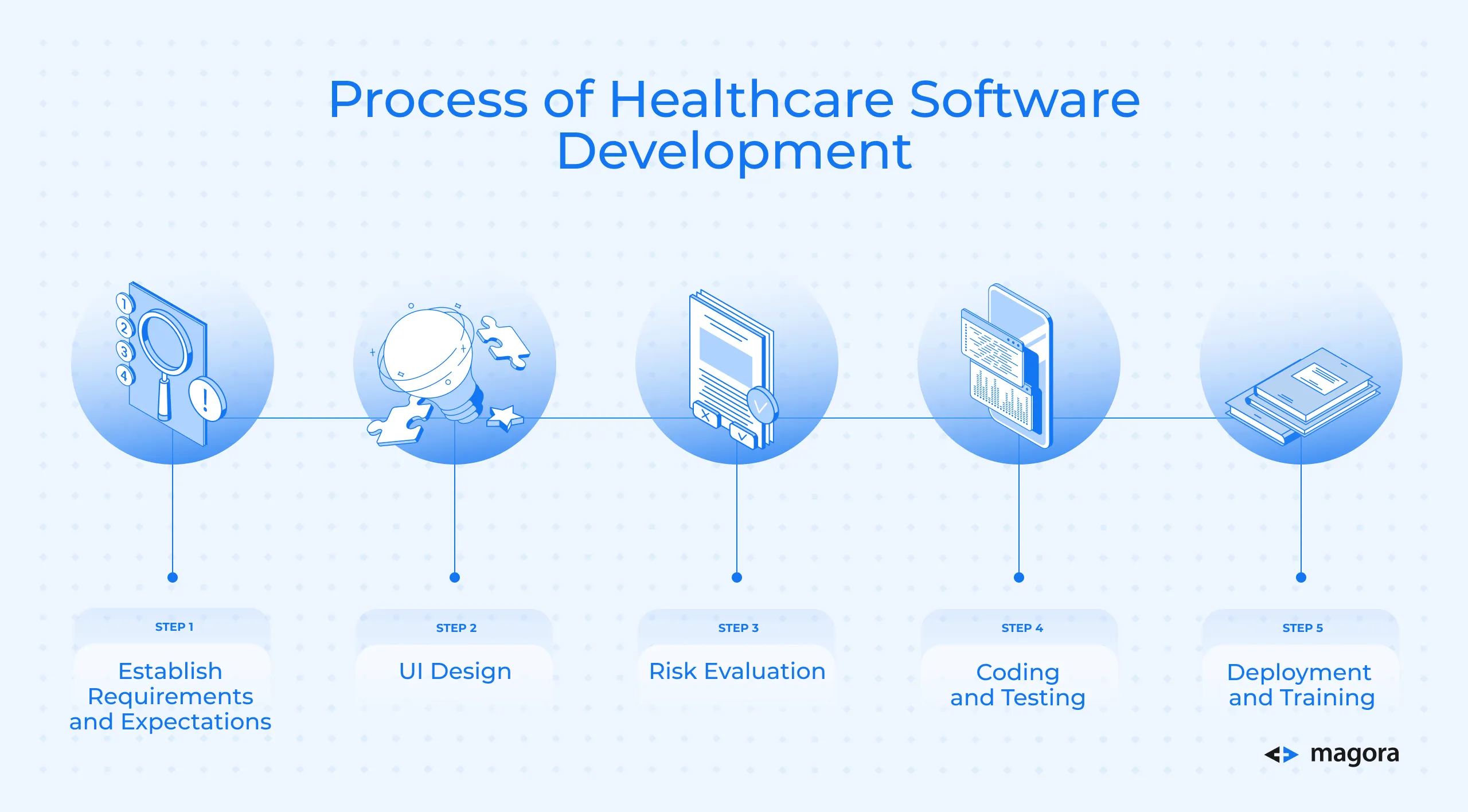
App development is a complex process that involves several stages, from conceptualization to deployment. Here is a high-level overview of the app development process:
Step #1: Discovery phase
The first step in the app development process is the discovery phase, in which you come up with an idea for the app and define its objectives. This involves identifying the target audience, defining the app's features and functionality, and creating a roadmap for its development.
Step #2: Design
Once the concept is defined, the design process begins. This involves creating wireframes and prototypes to define the app's user interface, user experience, and overall visual design.
Step #3: Development
The development process involves writing the code that brings the app to life. This includes building the app's front-end and back-end architecture, creating APIs, integrating third-party libraries and services, and testing the app throughout the development process.
Step #4: Quality Assurance
Quality assurance is a critical step in the app development process. This involves testing the app to identify and fix any bugs, glitches, or usability issues that could impact the user experience.
Step #5: Deployment and Maintenance
Once the app is ready, it is deployed to the app stores for download. After deployment, maintenance and updates are necessary to ensure the app remains up-to-date, secure, and functioning as intended.
The app development process is not linear and requires collaboration between various teams, including project managers, designers, developers, quality assurance engineers, and marketing specialists. Communication and coordination between teams are crucial to ensuring that the app is developed on time, within budget, and to the highest quality standards.
It is worth noting that the process of app development can vary depending on the type of app, its complexity, and the development team's specific approach. However, by following these general steps, Magora can create an app that is functional, user-friendly, and able to meet the needs of its intended audience.
Read more: Everything You Want to Know About Mobile App Development
How Much Does It Cost to Develop an App?
The cost of developing an app can vary widely depending on various factors, including the app's complexity, platform, development team, and location. Here are some of the main factors that can influence the cost of app development for startup:
App Complexity
The complexity of the app is one of the most significant factors that affect the development cost. An app that requires advanced features such as machine learning, augmented reality, or blockchain integration will cost more to develop than a basic app with simple features.
Platform
The platform on which the app is developed also affects the cost. Both iOS and Android app development will generally cost more than developing for a single platform.
Development Team
The cost of hiring a development team can vary depending on their experience, location, and hourly rates. Developers in the United States, for example, will typically charge more than developers in India or Eastern Europe.
App Maintenance
App maintenance and updates are crucial for keeping the app functioning and up-to-date. The cost of ongoing maintenance will depend on the app's complexity, the frequency of updates, and the development team's hourly rates.
Given these factors, the cost of developing an app can range from a few thousand dollars to several hundred thousand dollars. A basic app with simple features can cost between £4,000 and £8,500, while a more complex app with advanced features can cost between £40,000 and £125,000.
It's important to note that these figures are only estimates, and the actual cost of developing an app can vary significantly depending on the unique requirements of the project. It's always a good idea to consult with Magora’s professional mobile app development team to get a more accurate estimate of the costs involved.
How to monetize your App
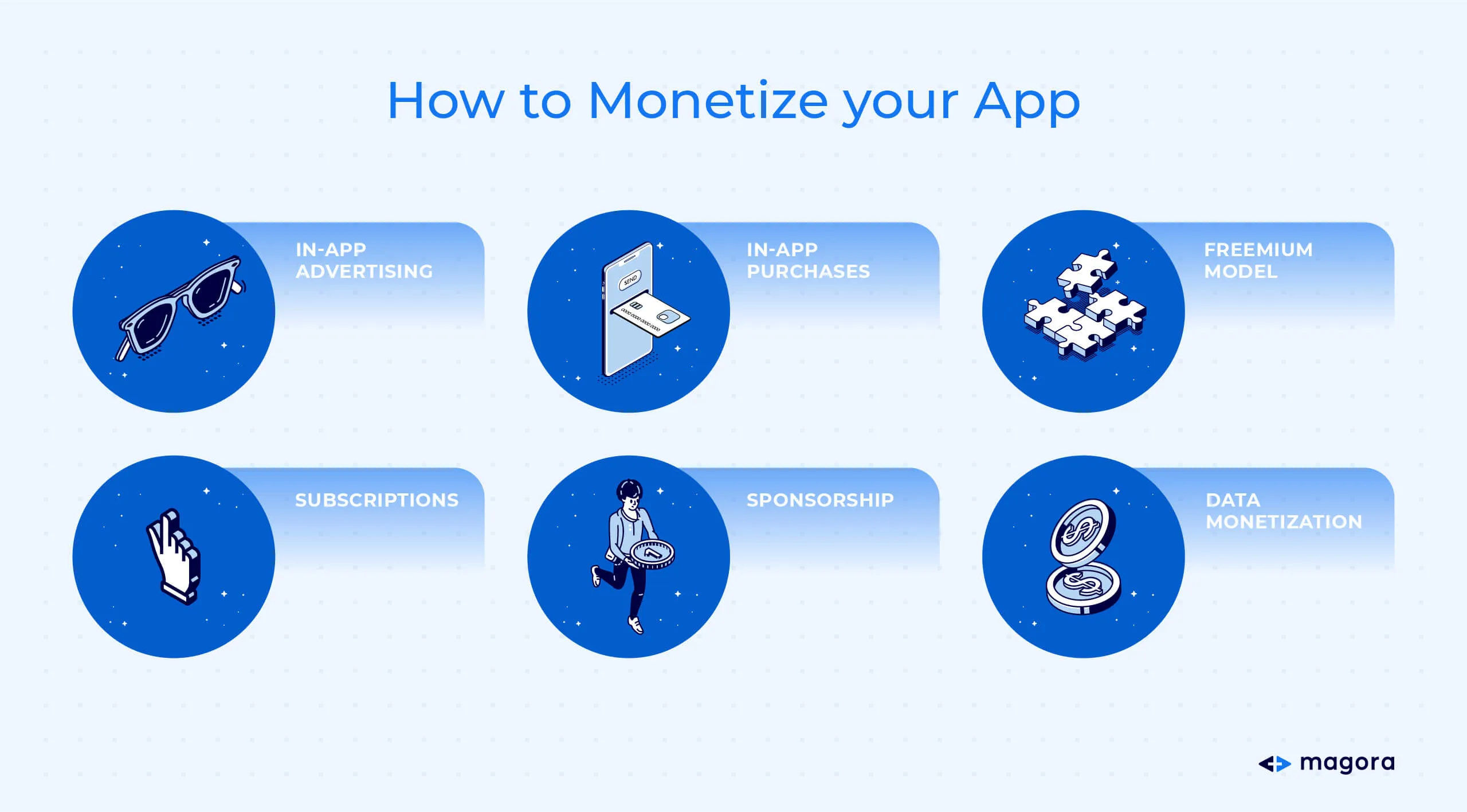
Monetizing your app is an essential aspect of app development, as it helps generate revenue to sustain and grow your business. Here are some common ways to monetize your app:
In-App Advertising
Displaying ads within your app can generate significant revenue. You can use ad networks such as Google AdMob or Facebook Audience Network to serve ads and get paid based on clicks, impressions, or installs.
In-App Purchases
Offering in-app purchases, such as virtual goods, upgrades, or subscriptions, can help generate revenue. This monetization strategy is particularly effective for gaming and utility apps.
Freemium Model
Offering a free version of your app with basic features and charging for premium features is a popular monetization strategy. This approach allows users to try out the app before deciding to pay for additional features.
Subscriptions
Charging users for access to premium content, features, or services is a popular monetization strategy for subscription-based apps. This approach is particularly effective for media and entertainment apps.
Sponsorship
Partnering with a brand or sponsor to promote their products or services within your app is another monetization strategy. This approach works well for lifestyle and fitness apps.
Data Monetization
Collecting user data and selling it to third-party companies can generate significant revenue. This monetization strategy is particularly effective for social media and e-commerce apps.
It's important to remember that the monetization strategy you choose should align with your app's goals and target audience. You should also consider the impact of monetization on the user experience and find a balance between generating revenue and maintaining a positive user experience.
How to Choose an App Development Company
Choosing an app development company is a critical decision that can impact the success of your app. Here are some key factors to consider when choosing an app development company:
Experience
Look for a company that has extensive experience in developing apps similar to yours. This will ensure that the company has the necessary expertise to handle your app's unique challenges.
Portfolio
Review the company's portfolio to see the quality of their work, the types of apps they have developed, and their overall design and development skills.
Development Process
Find out about the company's development process, including their approach to project management, quality assurance, and post-launch support.
Expertise
Look for a company with a team of experts who have the skills and knowledge to handle all aspects of app development, including design, development, testing, and deployment.
Client Reviews
Check the company's client reviews and ratings on platforms like Clutch, GoodFirms, and Upwork to get a sense of their reputation and track record.
Communication
Choose a company that has clear and effective communication channels in place. Good communication is essential for ensuring that your app is developed according to your specifications and that you are kept up to date on the project's progress.
Cost
Compare the costs of different companies to ensure that you are getting a fair price for the quality of work you expect.
Choosing the right app development company requires careful research and due diligence. By considering these factors, you can make an informed decision and choose a company that is best suited to your specific needs and requirements.
If you don't know how to hire high-quality mobile app developers, then you can read our detailed guide.
Cost estimation at Magora and Case Studies
We are a multidisciplinary team of experts who are inspired by the opportunity to create useful and advanced solutions for a wide range of industries. Thousands of hours of intensive work have formed the solid foundation needed to ensure the high and uniform quality of every piece of the software development process. We strive to organize a strong and fruitful collaboration to bring your bright idea to realization. Each of our projects has unique characteristics and different complexity profiles. Nevertheless, at Magora, we are well-versed in the creation of software and have the technical capacities and expertise to bring your business to the next level, whether it's an iOS app development, StarBuffet, to optimize restaurant workflow; an app for internal corporate content system organization, Pulsepoint; or an app for product quality control for multinational food corporation Danone. We don’t miss the opportunity to work in every business niche and share the success of the developed product. We could talk for hours about our previous cases and experiences; just write us a message, but it is better to start working on your idea right away.
FAQ
What is the projected revenue of the mobile app market by 2023?
According to Statista, the global mobile app market is projected to reach 935 billion U.S. dollars in revenue by 2023.
Why is it important to stay on top of mobile app trends?
By understanding the evolving needs and preferences of mobile users, businesses and developers can create apps that are more likely to succeed and capture a larger share of the market.
What are some of the most popular app categories in 2023?
The most popular app categories in 2023 are predicted to include social media, gaming, e-commerce, healthcare, and productivity apps.
What are some emerging mobile app trends to watch for in 2023?
Some emerging mobile app trends to watch for in 2023 include the rise of augmented and virtual reality, increased use of artificial intelligence and machine learning, and a focus on privacy and data security.
How can businesses and developers create successful mobile apps?
By staying up to date on trends and user needs, conducting thorough market research, and leveraging innovative technologies and design, businesses and developers can increase their chances of creating successful and impactful mobile apps.
Final words
As we approach 2023, the mobile app market shows no signs of slowing down. From social media to healthcare, the demand for mobile apps is evolving and expanding, providing opportunities for businesses and developers to create innovative and impactful solutions. By staying on top of the latest trends and user needs, businesses can stay competitive and capture a larger share of the market. As technology continues to advance and new trends emerge, it is essential to remain adaptable and willing to explore new ideas in order to succeed in this dynamic industry. Whether you're a developer, entrepreneur, or user, the future of mobile apps is exciting, and we can't wait to see what lies ahead.





